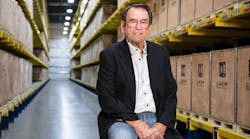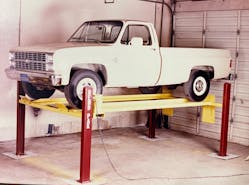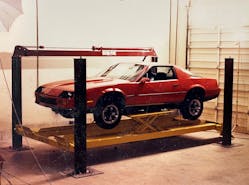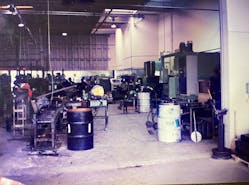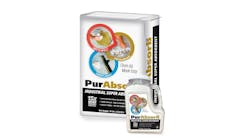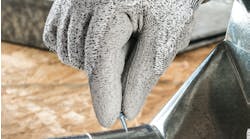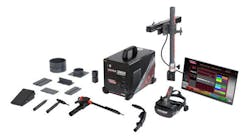When Don Henthorn founded a modest machine shop, Quality Machine & Associates, in Simi Valley, California, in 1965, the aerospace industry was booming and the nation’s collective sights were set on the moon. Henthorn supplied companies such as Rocketdyne, Rockwell, and Hughes Aircraft with precision parts, but he wanted to do more than make parts for other companies. He wanted to invent his own.
And that’s what he did over the next decade, first with a ball-joint replacement tool for automotive front ends called the 5ivePak. This all-in-one tool combined a coil spring compressor, U-joint press, and gear puller. Then he patented the Macpherson Strut Spring Compressor and a handheld portable hydraulic tailpipe extender. After the construction of a 20,000-sq.-ft. manufacturing facility in 1977 came the introduction of a hydraulic tubing bender to ease maintenance in muffler shops. While in the ’60s everyone was looking to the stars, in the ’70s Southern Californians could barely see past the thick layer of smog in the sky, so controlling vehicle emissions became a big business.
And Henthorn’s business became bigger because of it, as the company increasingly focused on serving muffler shops, and the name was changed to BendPak, now a recognized name in both automotive and commercial vehicle maintenance circles for its lifting technology. The company has sold more than 500,000 vehicle lifts since 1984 and includes a wide range of products such as car and truck service lifts, pipe benders, air compressors, tire changers, wheel balancers, wheel aligners, brake lathes, and more. Along with the BendPak brand, the company also owns Ranger, Cool Boss, MaxJax, Dannmar, and several others. A private fleet called Bolt Transport was even started up by BendPak this year to ensure reliable delivery of its freight. Overall, BendPak said its revenue grew by more than 200% over the last decade.
See also: BendPak launches Bolt Transport for nationwide hot shot deliveryNow, 57 years after Henthorn started up that job shop, BendPak claims to be the world’s largest supplier of lifts and automotive equipment. Henthorn has decided to go out on top, and in August he handed command over to his trusted employee of 40 years, Jeff Kritzer, who was promoted from EVP to president and CEO. Henthorn, now 83, has become chairman emeritus.
FM: What was your management style like?
DH: I was always very much hands on. At first, I didn’t have any knowledge as to what was needed out there, so I would talk to mechanics and they would tell me, “We have a big problem with this part or that part.” And that would give me a reason to go back and try to develop something to solve that problem.
FM: What are some business- and people-managing strategies you’ve found have helped you steer the company over the last 57 years?
DH: Working hard and never letting up is the biggest thing. Of course, with me, I didn’t have to satisfy any stockholders or anything, so I just always put the money right back into the business. But it’s been a big learning curve for me because I didn’t have any background in business development or anything like that.
I haven’t changed my philosophy of work at all. I’m usually in the office by 5:30 a.m. to 6:00 a.m. I leave earlier than I used to now—usually I’m out of here by 4 p.m.
And I know everybody’s name who works for me. I start every day off with a “Good morning” to every one of them who I approach. People need to know what they can expect from you. I think they know that with me. I may have to scold them a little, but I will always be fair. And they’ll know that before we ever had the meeting, because I am always that way.
FM: As far as developing a leadership team that can execute your strategies, aside from working hard, what other skills have you found over the years that are important to look for when hiring?
DH: In interviews, I’d ask questions just to see if the guy is trying to impress me or if he’s really sincere. Sincerity is a big thing. And I think you can read it in people. So often, I get these resumes that tell me the person saved their company $2 million a year. And I’m thinking to myself, “Why in God’s name would they ever let you go?”
You can tell if they know their industry, or their function, with a few simple questions. You get the right direction from it. I don’t have any formula; I just go by feel.
I’ve been so blessed to have been able to choose the right people to do the jobs, and I pride myself in being pretty good at selecting staff, including Jeff Kritzer, of course, but there’s a whole list behind him. There are a lot of people who have been with me for over 30 years. And I really appreciate those people we have.
FM: Leaders are also molded by their failures. Any that stick out to you that have helped you achieve success later?
DH: Without failures, you’ve got no successes. I’m lucky that I haven’t had so many failures that set me back very much. Early on, there was one lift I put a lot of work into where I tried a chain drive, and it just didn’t work out very well because of my lack of experience with lifts. I learned a lot from that failure. The next unit was still a chain drive, but it worked much better and was a saleable lift. Ultimately, we went to a cable drive.
FM: On that subject, what have been some of the biggest changes in lifts?
DH: The biggest were all safety changes. Speed and safety are always paramount with lifts. There were problems in the industry back then with accidents. It’s not as though they were happening frequently, but they were happening. And it made us all aware of our duty to design and build better-quality and safer products. I keep focusing on the safety because if you’re getting under a lift, you want to feel comfortable about that.
From the ’80s on, we were always trying to develop better-quality lifts all the time and making innovative changes. One I am proud of at BendPak was when we developed an arm lock for the two-post lift.
FM: How long have you been thinking about your succession plan and how did you pick your new CEO?
DH: I’ve been thinking about succession for 20 years probably, but not very seriously until perhaps the last five years. I needed to know what I was going to do in the business and how it was going to continue. I feel I built something worthwhile here, and I’d like to see it turned over to someone in good hands. Jeff Kritzer fits the bill in every way. Jeff came to work for me 40 years ago, and he’s never let up. He’s had his foot on the gas pedal all the way. He’s been reliable, responsible, and as much family as I could have. So, it was a pretty easy choice for me to make him the new CEO.
